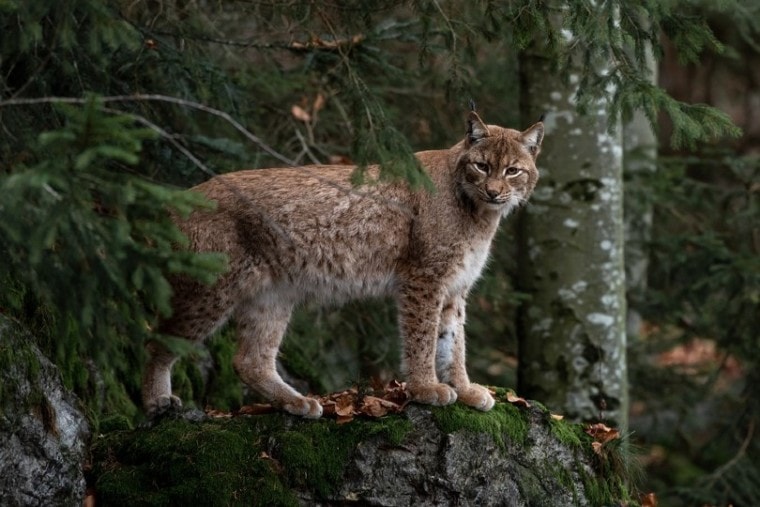
More and more, we see people looking for unusual, exotic pets. Whether it’s because they’re bored with the normal dog and cat options, or they’re looking for social media clout and attention, many people find themselves searching for abnormal pets. This has led to an uptick in people acquiring pets that shouldn’t be pets in the first place and that aren’t legal to own in many areas.
Thanks to the rise of social media, our daily lives are becoming inundated with cute videos of these unusual pets living their best lives. There’s a video that floats around from time to time of a bobcat making “biscuits” on a pillow. It’s an adorable video that certainly catches your attention, but is it actually a good idea to keep a bobcat as a pet? The answer is no. Keep reading to find out why.
Do Bobcats Make Good Pets?
Some people argue that bobcats can make great pets for the right home, but when it comes down to it, they are wild animals. Bobcats are not domestic cats and being kept as a domestic pet can create a stressful and downright dangerous environment. Many of the videos we see of wild animals doing cute things are videos of animals that are in the care of rehabs and rescues. These facilities often take in wild animals that were inappropriately kept as pets, so now they can’t be set free into the wild, even though the owner doesn’t want the animal anymore.

Wild Animals Don’t Belong in a Home
While bobcats may be affectionate, interesting pets when hand raised from a very young age, they are still wild animals. Think of all the interactions you have with domestic pets that would go a lot differently if a wild animal were involved. When you walk through the house and accidentally kick your cat, they usually run away. If you catch your dog eating your dinner, they sulk out of the room as you scold them. However, even the tamest wild animal will respond differently. If you accidentally kick your pet bobcat, you might become the subject of a vicious attack. If you try to pull your pet bobcat out of your plate of food, you might suddenly be face to face with a wild animal that feels like it needs to protect that precious resource.
Cats and dogs have been domesticated for about 10,000 and 11,000 years, respectively. That’s a really long time where selective breeding has been at play to develop the pets we know and love today. If you get a wild animal that is a second or third generation domesticated animal, or a wild-caught animal, then you are dealing with a wild animal. You are dealing with a handful of years of domestication, at the most. You are dealing with an animal that hasn’t had undesirable qualities in a pet bred out of it. When it comes to bobcats, you’re dealing with about 30 pounds of angry teeth and claws if you make a wrong move.

Major Safety Concerns
Obviously, none of this has even taken into account the danger that these animals pose to children, visitors, and domestic pets. Even bobcats that have been hand-reared may still see small animals or children as a threat or prey. Children in particular have a hard enough time understanding proper interactions with animals, especially if there isn’t significant adult oversight when children and pets are together. This leads to children being hurt or maimed by docile domestic animals. Imagine what a wild animal could do to a child.
Is It Legal to Keep a Bobcat as a Pet?
The answer to that question is fully dependent on where you live. Some states allow for the ownership of wild animals, like bobcats. Some require ownership to occur outside of city limits or only allow for wild animal ownership with permits and licenses. Some states banned the ownership of bobcats outside of rescue and rehab facilities and licensed zoos, like Connecticut and Illinois. Although it is highly unadvisable to attempt to keep a bobcat as a pet, if you are attempting to do so, it’s important that you check your state laws. If you end up illegally owning an animal like a bobcat, then you can be subject to high fines and even jail time if caught, and your bobcat may be rehomed to rescue or destroyed.
Conclusion
When it comes to bobcats, they are best left in the wild. They may seem cute and cuddly, but their wild nature and instincts can cause them to turn on a dime, even in the most gentle home. Bobcats should be treated with respect and given space. In the wild, bobcats, actively avoid humans. Seeking out bobcats can lead to unnecessary stress for the animals and danger to you. Keeping a bobcat as a pet is setting the animal up to fail and you potentially be in a bad situation where someone or something was injured or killed by the wild animal you chose to keep as a pet.
Featured Image Credit by: Eszter Miller, Pixabay







